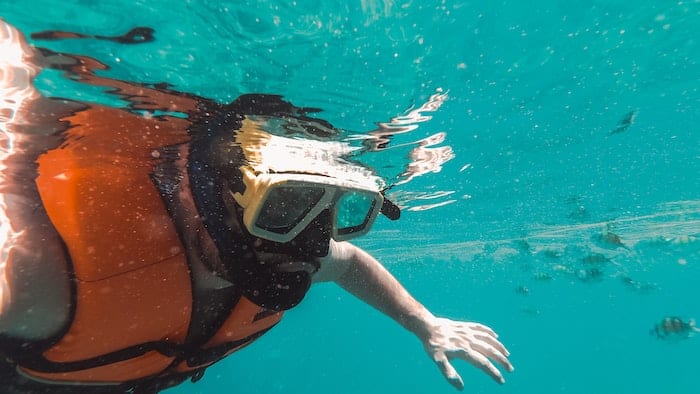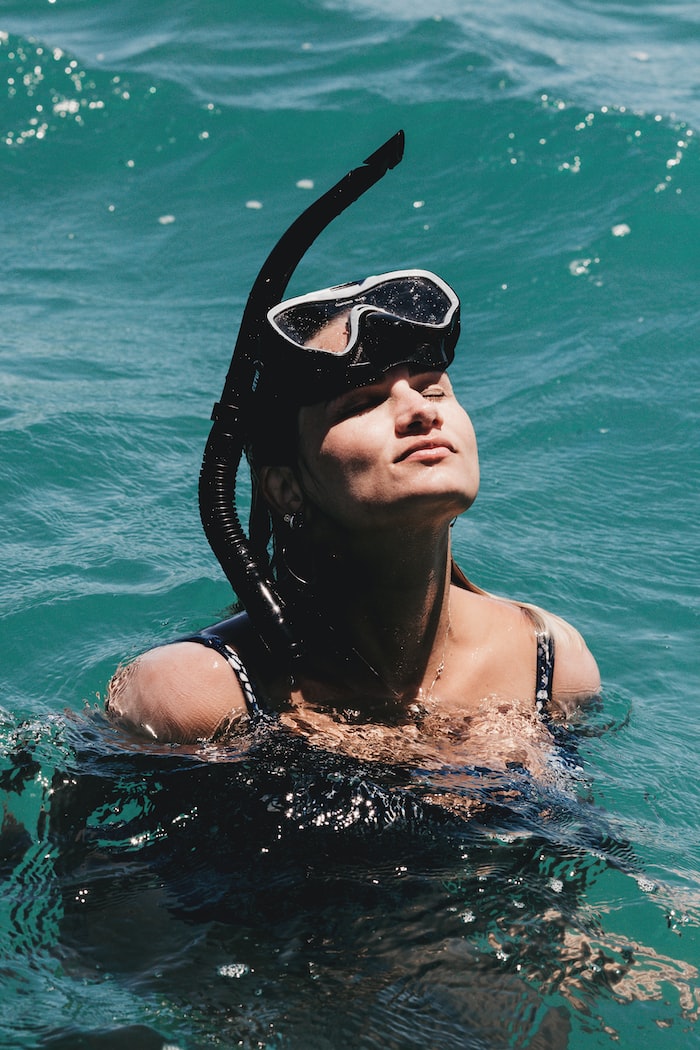Snorkeling is a great way to get up close and personal with the underwater world, and it’s no wonder that it’s gaining popularity in recent years. However, some people have reported experiencing a sore throat after snorkeling. In this article, we’ll talk about the cause of this sore throat and what you can do to prevent it. Continue reading below to learn more about it.

How Does Snorkeling Cause a Sore Throat?
Snorkeling is a great way to get up close and personal with the underwater world. But, have you ever noticed that you can get a sore throat after snorkeling? Here’s why:
When you snorkel, you are constantly breathing in through your mouth. This can cause the air to become dry and irritate your throat. In addition, if there is any salt water in the air, it can also contribute to a sore throat.
To avoid getting a sore throat while snorkeling, be sure to drink plenty of water before and after you go in the water. This will help keep your throat hydrated. You may also want to consider using a humidifier in your room to help keep the air moist.
The Symptoms of A Sore Throat from Snorkeling
A sore throat is a common ailment that can be caused by many things, including snorkeling. While the symptoms of a sore throat from snorkeling are usually mild and go away on their own, they can sometimes be more severe and require medical attention.
The most common symptom of a sore throat from snorkeling is a burning or scratchy sensation in the throat. This is often accompanied by pain when swallowing, as well as Swelling of the lymph nodes in the neck. Other symptoms may include hoarseness, difficulty breathing, and a fever.
Fun Outdoor Quiz
A sore throat from snorkeling is usually caused by bacteria or viruses in the water, which can lead to more serious infections if not treated promptly.

How to Prevent a Sore Throat from Snorkeling
Snorkeling is a great way to explore the underwater world, but it can also be a pain – literally. A sore throat is one of the most common complaints among snorkelers, but there are ways to prevent it.
- Make sure you have a good fitting mask and snorkel. If your mask is too loose, water will leak in and irritate your throat. The same goes for your snorkel – if it’s not sealing properly, water will again leak in and cause discomfort.
- Try to avoid getting water in your mouth while snorkeling. This may seem difficult, but it’s actually not as hard as it sounds. Just be aware of where your mouth is in relation to the surface of the water and try not to let any splash in.
- Take breaks often when snorkeling. Swimming for long periods of time can dry out your throat and lead to irritation.
- Drink plenty of water before and after snorkeling to stay hydrated.
By following these simple tips, you can prevent a sore throat from snorkeling and enjoy your time in the water!
Can You Go Snorkeling if You Already Have Sore Throat?
Sore throat is a common condition that can be caused by a number of things, including viral infections, allergies, and even overuse of the voice. While sore throat is usually not serious, it can be very uncomfortable. If you’re planning on snorkeling, you may be wondering if it’s safe to do so with a sore throat.
The answer depends on the cause of your sore throat. If your sore throat is due to a viral infection, such as the common cold or flu, then it’s generally safe to go snorkeling. However, if your sore throat is due to an allergy or irritation, then you may want to avoid snorkeling. This is because diving into water can make these conditions worse.

Other Common Conditions that Can Be Caused by Snorkeling
Snorkeling is a great way to enjoy the underwater world without having to invest in scuba diving gear and lessons. However, there are some health risks associated with snorkeling that you should be aware of before you dive in. Here are four common conditions that can be caused by snorkeling:
Swimmer’s Ear
Swimmer’s ear is an infection of the outer ear canal, and it can be caused by water that stays in the ear after swimming. It can also be caused by bacteria that enters the ear through a cut or scratch. Symptoms of swimmer’s ear include pain, itching, and drainage from the ear.
Sinus Infections
Another common condition that can be caused by snorkeling is sinus infections. Sinus infections are usually caused by viruses, but they can also be caused by bacteria that enters the sinuses through the nasal passages. The symptoms of sinus infections include headache, fever, and congestion.
Dizziness and Vertigo
Dizziness and vertigo are also some common conditions that can be caused by snorkeling. Dizziness is caused by a change in the pressure of the air in the inner ear, while vertigo is caused by a problem with the balance mechanism in the inner ear. Both conditions can be treated with over-the-counter medication and should improve within a few days.
Nausea
One common condition that can be caused by snorkeling is nausea. Nausea is a feeling of sickness in the stomach that can lead to vomiting. It can be caused by many things, including motion sickness, dehydration, and infections. If you’re feeling nauseous while snorkeling, it’s important to get out of the water and rest. Drink plenty of fluids and try to eat something bland like crackers or toast. If your symptoms persist, see a doctor.
While nausea is unpleasant, it’s usually not serious and will go away on its own. However, if you’re pregnant or have a medical condition like heart disease or diabetes, be sure to talk to your doctor before you go snorkeling.
Conclusion
In conclusion, it is possible for snorkeling to cause a sore throat. This is because the snorkel tube goes into the back of the throat and can irritate the area. It is important to take breaks while snorkeling and to drink plenty of water to stay hydrated. If you start to feel a sore throat coming on, be sure to see a doctor.






